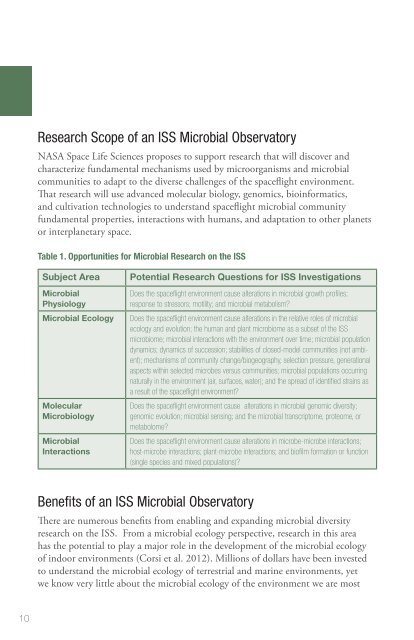Microbial-Observatory-Mini-Book-04-28-14-508
Microbial-Observatory-Mini-Book-04-28-14-508
Microbial-Observatory-Mini-Book-04-28-14-508
Create successful ePaper yourself
Turn your PDF publications into a flip-book with our unique Google optimized e-Paper software.
Research Scope of an ISS <strong>Microbial</strong> <strong>Observatory</strong>NASA Space Life Sciences proposes to support research that will discover andcharacterize fundamental mechanisms used by microorganisms and microbialcommunities to adapt to the diverse challenges of the spaceflight environment.That research will use advanced molecular biology, genomics, bioinformatics,and cultivation technologies to understand spaceflight microbial communityfundamental properties, interactions with humans, and adaptation to other planetsor interplanetary space.Table 1. Opportunities for <strong>Microbial</strong> Research on the ISSSubject Area<strong>Microbial</strong>Physiology<strong>Microbial</strong> EcologyMolecularMicrobiology<strong>Microbial</strong>InteractionsPotential Research Questions for ISS InvestigationsDoes the spaceflight environment cause alterations in microbial growth profiles;response to stressors; motility; and microbial metabolism?Does the spaceflight environment cause alterations in the relative roles of microbialecology and evolution; the human and plant microbiome as a subset of the ISSmicrobiome; microbial interactions with the environment over time; microbial populationdynamics; dynamics of succession; stabilities of closed-model communities (not ambient);mechanisms of community change/biogeography, selection pressure, generationalaspects within selected microbes versus communities; microbial populations occurringnaturally in the environment (air, surfaces, water); and the spread of identified strains asa result of the spaceflight environment?Does the spaceflight environment cause alterations in microbial genomic diversity;genomic evolution; microbial sensing; and the microbial transcriptome, proteome, ormetabolome?Does the spaceflight environment cause alterations in microbe-microbe interactions;host-microbe interactions; plant-microbe interactions; and biofilm formation or function(single species and mixed populations)?Benefits of an ISS <strong>Microbial</strong> <strong>Observatory</strong>There are numerous benefits from enabling and expanding microbial diversityresearch on the ISS. From a microbial ecology perspective, research in this areahas the potential to play a major role in the development of the microbial ecologyof indoor environments (Corsi et al. 2012). Millions of dollars have been investedto understand the microbial ecology of terrestrial and marine environments, yetwe know very little about the microbial ecology of the environment we are most10


